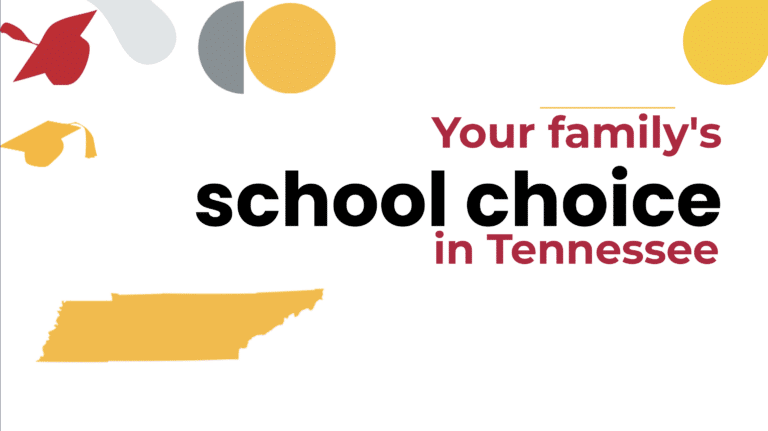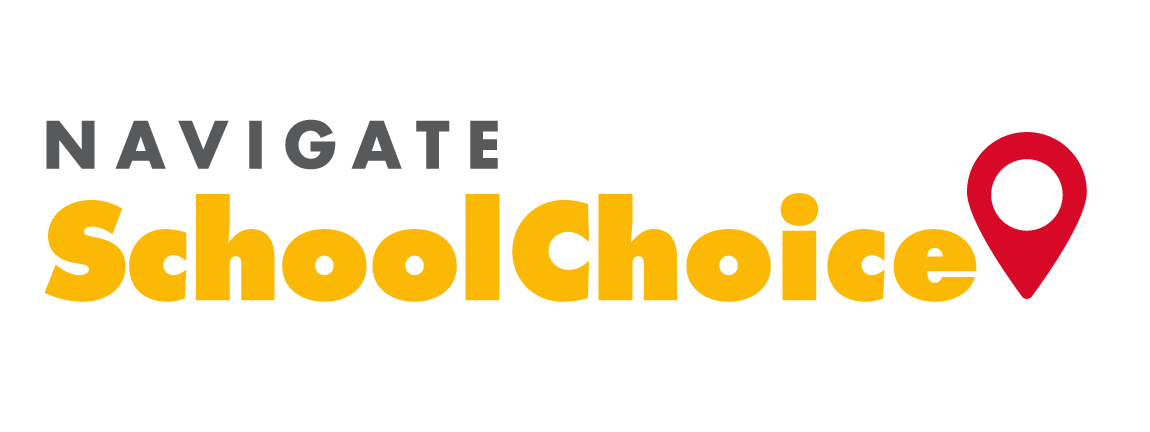Choosing a school? You’ve got options.
Each spring, parents face one of the biggest decisions they can make for their child’s future: What school environment will their child spend about 1,000 hours in next year?
Making that decision with confidence starts with knowing what options you have; you may have more school choices in Tennessee than you realize! Understanding these options can help you find a school where your child grows and learns to the best of their ability. Tennessee families can choose from traditional public schools, public charter schools, public magnet schools, private schools, online learning, homeschooling, and microschooling and mix-and-match learning.
Interested in learning more about Tennessee’s Education Savings Account (ESA) program? Check out our deep dive blog to guide you through it!

- Traditional Public Schools
- Public Charter Schools
- Public Magnet Schools
- Private Schools
- Online Schools
- Homeschool
- Microschooling
Tennessee Traditional Public Schools
Most Tennessee families choose traditional public schools, which are operated by school districts, free to attend, open to all students, and funded by taxpayers. Did you know that, on average, Tennessee spends $10,507 per public school student each year?
Tennessee has more than 1,700 public schools. Currently, 78% of all K-12 students attend a traditional public school in Tennessee. Since fall 2022, all school districts in Tennessee have offered an open enrollment period. Open enrollment refers to whether parents can send their children to any public school, regardless of where it is located. Tennessee’s expanding open enrollment options mean that parents may be able to transfer their child to any public school, regardless of where they live. However, note that in some cases, receiving districts in Tennessee charge fees for out-of-district students.
Open enrollment is an important way that parents have access to a broader variety of public schools. Find out more about public schools in your state at the Tennessee Department of Education or the online dashboard of the Tennessee Comptroller’s Office. You can also learn more about open enrollment at “Public Schools without Boundaries: A 50-State Ranking.”
Tennessee Charter Schools
Tennessee has more than 110 public charter schools, many of them in Memphis and Nashville. In Tennessee, 4% of all K-12 students attend a public charter school. Like traditional public schools, charter schools are public, free, and typically have no requirements for entry. What distinguishes charter schools is that they have extra freedom to innovate with learning methods and are accountable to authorizing entities for student results.
Each school has a charter which explains the school’s purpose and what specific community need it serves, whether that be providing a language immersion program or offering a rigorous, literacy-based curriculum. If there are more families seeking admittance to a charter school than there are seats, a lottery system (like drawing random names out of a hat!) is usually used to determine admittance.
Tennessee’s first charter school, Memphis Academy of Science and Engineering, was founded in 2003. Today, Tennessee’s charter schools serve more than 38,000 children.
Free transportation may be available to some students who attend charter schools in Tennessee and live within the district where their charter school is located, either through a local education agency (LEA) or the charter school itself. Students with special needs and an Individualized Education Program (IEP) are eligible for transportation assistance.
You can learn more about your state’s charter options at the TN Charter School Center.
Tennessee Magnet Schools
You can also choose magnet schools! In Tennessee, 7.2% of all K-12 students attend a public magnet school. Magnet schools are free public schools that allow kids to narrow in on a specific learning track, such as an International Baccalaureate program or the performing arts. A magnet school teaches all subjects through the lenses of that specific track. Tennessee has several magnet schools. For example, the Hamilton County School District, Knox County School District, Metropolitan Nashville Public School District, Rutherford County School District, and Shelby County School District all offer magnet choices, among others. If your child learns well through diving deeply into a particular subject, a magnet school could be a good fit.
Tennessee Private Schools
Tennessee families can also choose private schools. These nonpublic schools charge tuition and offer a unique learning environment that may be smaller in size, pass on a specific religious tradition, or provide a different curriculum than is available in your district school.
There are more than 550 private schools across the state of Tennessee. The average tuition for private schools in the state is $10,444 for elementary schools and $11,086 for high schools.
Some tuition assistance is available. In Tennessee, students with special needs may be eligible for a publicly funded Individualized Education Account. In 2022, this program was expanded to include students with dyslexia. Also, low-income and middle-income students zoned to attend a Shelby County District school, Hamilton County or Metro Nashville Public School may qualify for a state-funded education savings account to attend a private school of their choice. Families can find an enrollment form and more details at the Tennessee Department of Education. Additional funding may be available from other sources. Currently, 0.2% of all K-12 students in Tennessee participate in a private school choice program.
Learn more at Private School Review: Tennessee. You can also find information about private schools at the online dashboard of the Tennessee Comptroller’s Office.
Tennessee Online Learning
Don’t overlook virtual learning, which offers a uniquely flexible learning environment that meets a variety of family needs. Whether your child wants to accelerate learning or needs a quieter, stress-free environment in which to focus, you may be interested in trying online school.
Virtual schools in Tennessee are overseen by school districts. While some virtual schools may be open only to in-district students, others (like Tennessee Virtual Academy and Tennessee Connections Academy) serve students statewide.
As of 2024, Tennessee has more than 50 virtual schools! Schools that are approved to serve all grades K-12 statewide include Bradley County Virtual School (currently serving grades 3-12), Greene Online Academy of Learning (currently serving grades 6-12), Maryville Virtual School (currently serving grades 2-12), Memphis Virtual School (currently serving grades 4-12), Putnam County VITAL (currently serving grades 3-12), the iLearn Institute at Lenoir City, Tennessee Online Public School, Hawkins County Virtual Academy, Pioneer Virtual Academy, and Roane County Virtual Academy.
You can find a complete list of Tennessee’s virtual schools, both those that enroll statewide and those designed for local students, at the Tennessee Department of Education. More than 10,000 students in Tennessee used a fully online schooling option in 2020-2021!
To read more about online learning in Tennessee, check out the Digital Learning Collaborative’s state profile.
Tennessee Homeschooling
Families can also choose to homeschool. This option allows for high levels of customized learning and flexibility. All 50 states allow homeschooling, the process of parents educating students at home.
In Tennessee, 1.5% of all K-12 students are homeschooled. If you are an independent homeschool, it is required that you provide notice of intent to homeschool before the school year or upon choosing to homeschool and annually thereafter. Formally withdrawing from public school is required in some districts and recommended for all districts. If you decide to return to public school, your school will assess to determine grade level placement.
While the state doesn’t lay out specific subjects that homeschooling families must teach, it does require that homeschooling students take standardized tests in some grades. Note that homeschooled students in Tennessee may still be eligible to participate in sports or activities at local public schools.
Tennessee offers funding assistance for students with special needs through the Special Needs Individualized Education Account Program.
You can learn more at the Tennessee Department of Education’s Homeschooling page, Home School Legal Defense Association – Tennessee, and the Tennessee Home Education Association.
Tennessee Microschools and Mix-and-Match Learning
K-12 education is changing rapidly. Today, many Tennessee families are mixing and matching school options to come up with new ways to personalize education. Microschools are one of these ways. A microschool refers to students gathering together in a small group – with adult supervision – to learn, explore, and socialize. Microschools can take a variety of shapes and legal forms, from homeschoolers coming together at an enrichment center to a private school committed to small classrooms. What microschools share in common is a distinct commitment to small-group learning, close-knit relationships, and an emphasis on children as individual learners.
Here are just a few real examples of microschools in Tennessee:
- The Lab School is an innovative microschool located in the heart of Memphis that serves children ages 5-11.
- Discovery Learners’ Academy is a nontraditional microschool in Chattanooga offering personalized academics, social emotional coaching, and discovery-based science and social studies.
- Imani Montessori is a microschool and homeschool umbrella in East Nashville that seeks to cultivate free thinkers, creative, compassionate, and committed global citizens in service to humanity.
Remember, microschooling is more a mentality than a specific legal distinction in most cases. Often, a family participates in a microschool while legally homeschooling, or being enrolled in a private or online school.
[nscw_school_finder]
Microschooling and Mix-and-Match Learning
How can it empower parents and help kids achieve their dreams?
7 Step Guide
Tips to help you find a school where your daughter or son will learn, succeed, and be happy.
Education Resources for
Tennessee Parents
For additional information about school choice in
Tennessee, visit these resources:
Every state is different when it comes to school choice options.
Sign up below to get a detailed comparison:
"*" indicates required fields



